The Path Forward








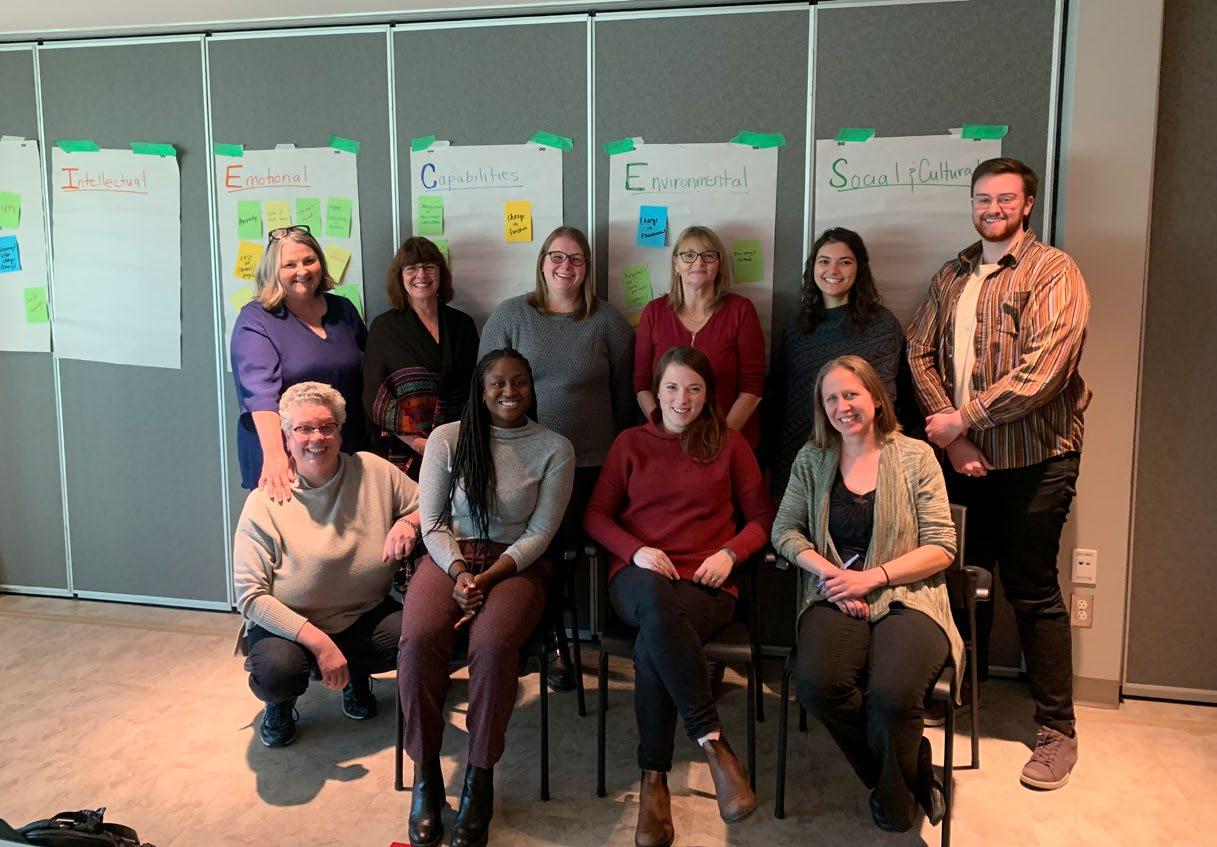

Improve public awareness about brain health, promote risk reduction, spark dynamic public discourse and reduce stigma by encouraging people to take concrete action to make their communities dementia friendly.

Ensure Nova Scotians can receive a timely diagnosis, culturally appropriate support and are connected to our First Link® services. Help those living with dementia, and their care partners, have the skills and resources to live as well as possible at all stages of their journey.

Foster a collaborative impact approach to educating staff and volunteers in healthcare settings, municipalities, businesses and public services so they have the skills to include and support ALL Nova Scotians living with dementia.
Collaborative and supportive advocacy with healthcare, municipal and provincial partners, leveraging the voices of those with lived experience to ensure focus on solutions to issues that matter most to them.
Pages 18-21
Support provincial and national research exploring causes, therapies and cures, quality of life and care improvements. Promote knowledge translation and uptake of innovation in the community and healthcare.


Another year has passed, and another year where we continued to find our way in the post-pandemic world. This last year has seen a gradual return to in-person initiatives and strengthening online and hybrid support programs. This year also marked the 40th anniversary of the Society.

For forty years, we have been, and remain, committed to providing Help for Today and Hope for Tomorrow. We continue to listen to the lived experiences of our clients, to lean into scientific evidence, and do our part to address the many systemic challenges facing Nova Scotians on the dementia journey.
Last year saw the release of The Landmark Study Volume One, the first new Canadian dementia data since 2010. What it tells us is staggering. Nova Scotia may see up to an 87% increase in those living with a dementia diagnosis by 2050.
That means increased impacts on family caregivers, friends, support networks, and of course our already overwhelmed health care system. Accessing dementia supports can be challenging for anybody, but especially so for those who live in rural areas or equity seeking communities. We must think differently about how we respond to these growing and changing needs and how we support those on the dementia journey, wherever they live or however they identify.
But, there is also a narrative of hope. The study also tells us that by focusing on brain health and reducing risk at population level, it is possible to lower these projections and potentially even reverse the trend. Investing in brain health now can have significant impact on the likelihood of developing the disease. For those already on the dementia journey, a timely diagnosis can facilitate early access to supports to live as well as possible.
We know we need to think and do differently. Our existing programs will grow and strengthen to meet this ever-increasing need. We also need to think about deeper investments in community engagement, access to diagnosis, population-level brain health, and ensuring access to support services where people live. You can read more about The Landmark Study Volume One on our website at alzheimer.ca/ns/landmark.
It’s a long path. But it’s one we know we are well prepared to walk. And with your continued support, we can ensure ALL Nova Scotians have access to the support and services they need.
We hope you enjoy learning about our activities and impact over the last year, and how we are signaling innovative changes in how we offer that support in light of this new data.
John Britton CEO
One in the fall of 2022 showed us that it was truly time to change the conversation about dementia. The study indicated that 40% of the incidence of dementia could be avoided through risk reduction.
Risk reduction is not universally understood, and often the focus is on what you shouldn’t do instead of what you should. To support better understanding, we started a public conversation about it with 12 concrete actions

that individuals can take to reduce their risk of dementia. This is also one of the themes of our public education sessions.
This included six interviews with traditional media in September, and 11 additional interviews in January during our annual awareness month campaign. Our Community Night and Awareness events also focused on the empowering narrative of risk reduction.
To learn more about the Landmark Study and risk reduction, visit alzheimer.ca/ns/landmark.
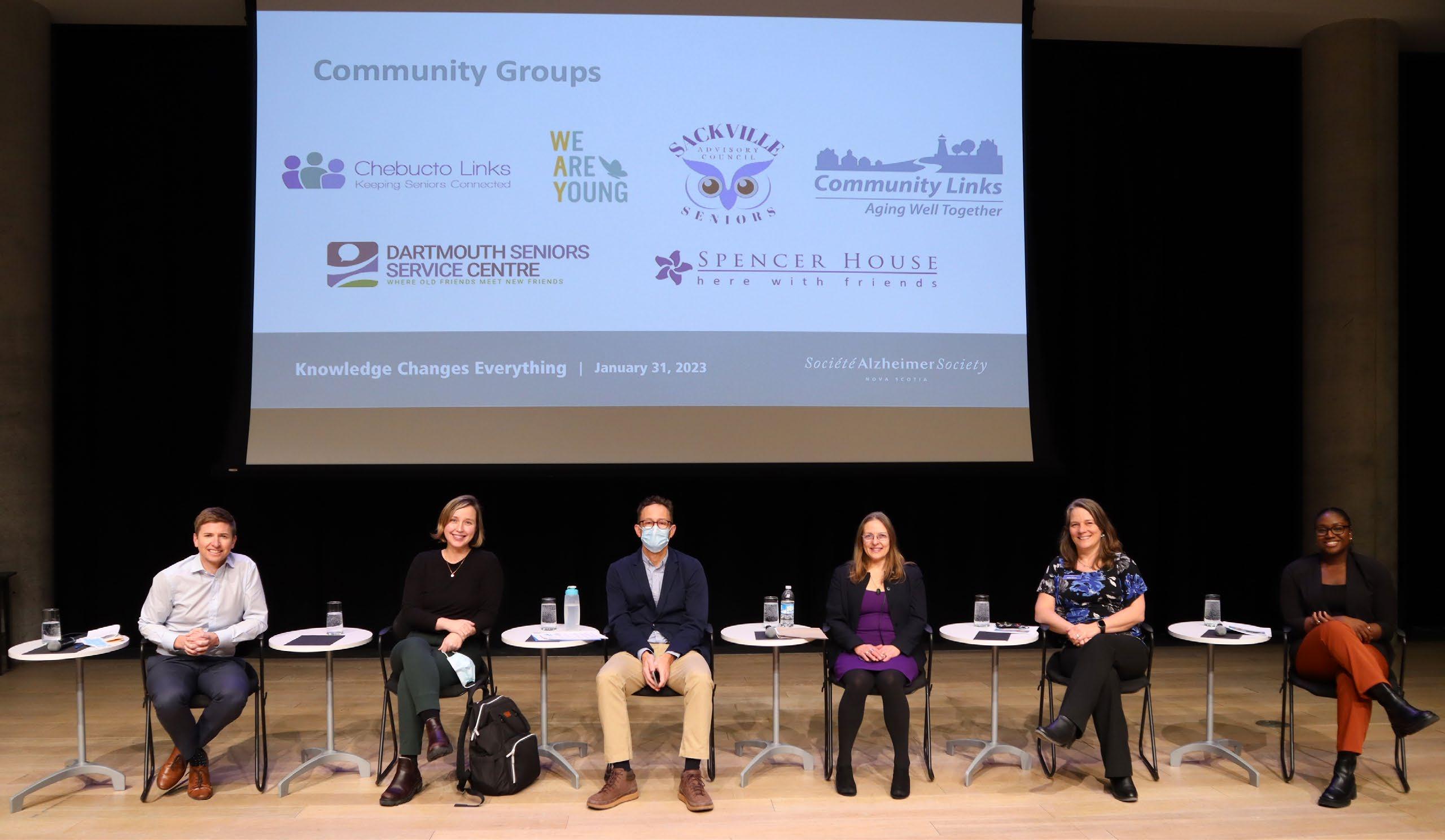
With the pandemic still preventing an inperson Walk in 2022, we continued with Walk Your Way in May. It gave Walkers the opportunity to fundraise and support us, while doing their own Walk in their communities anytime throughout the month of May.
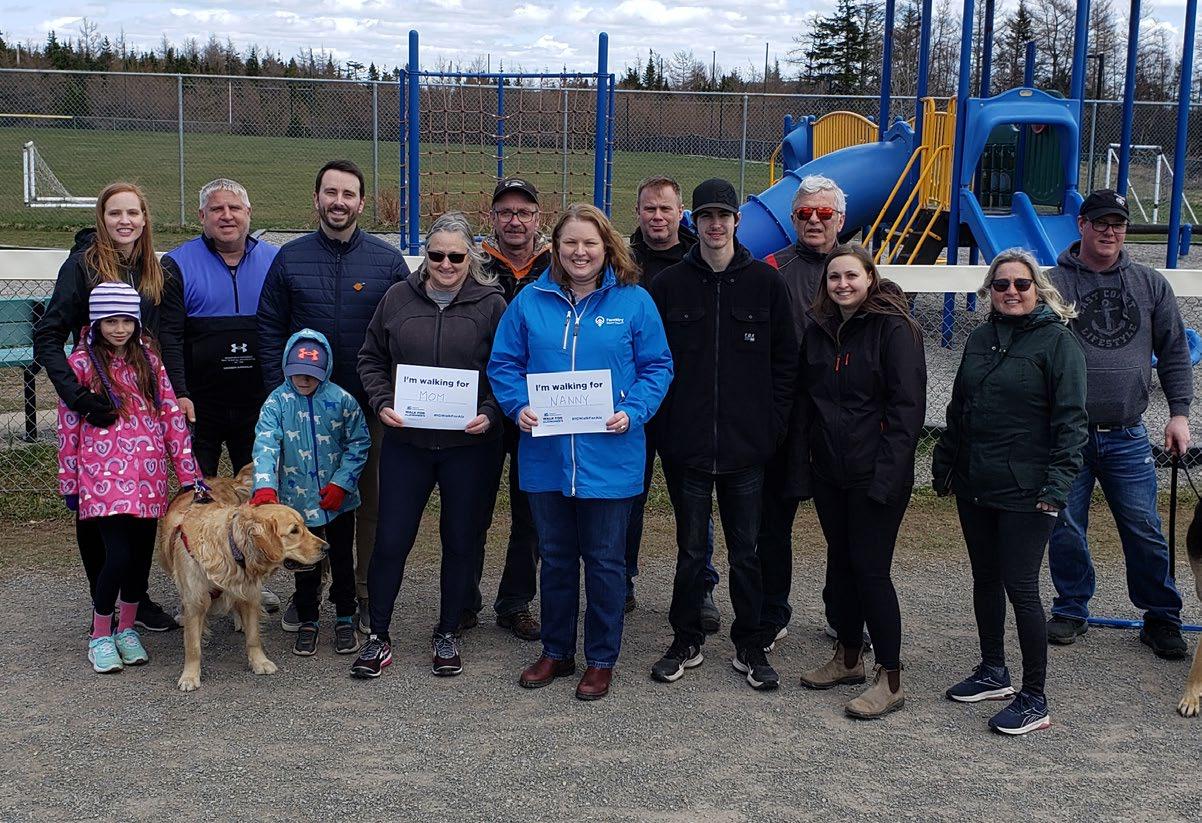
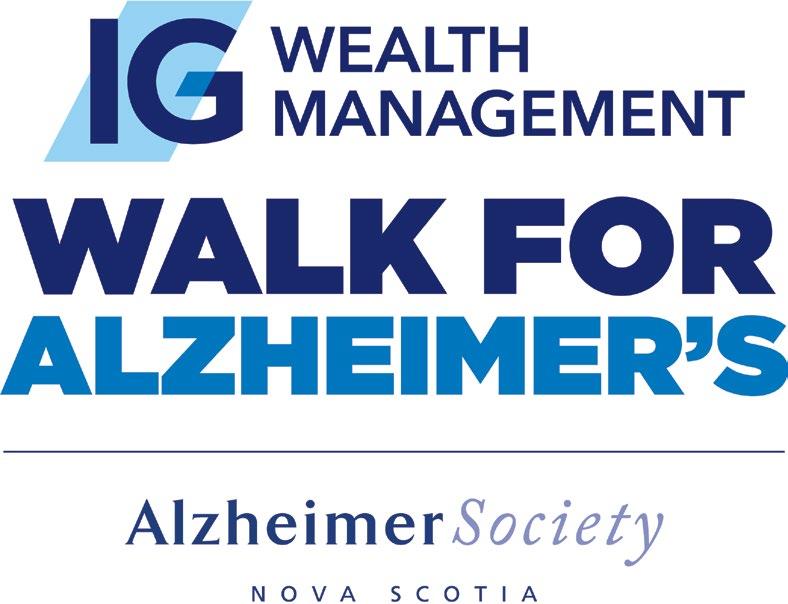
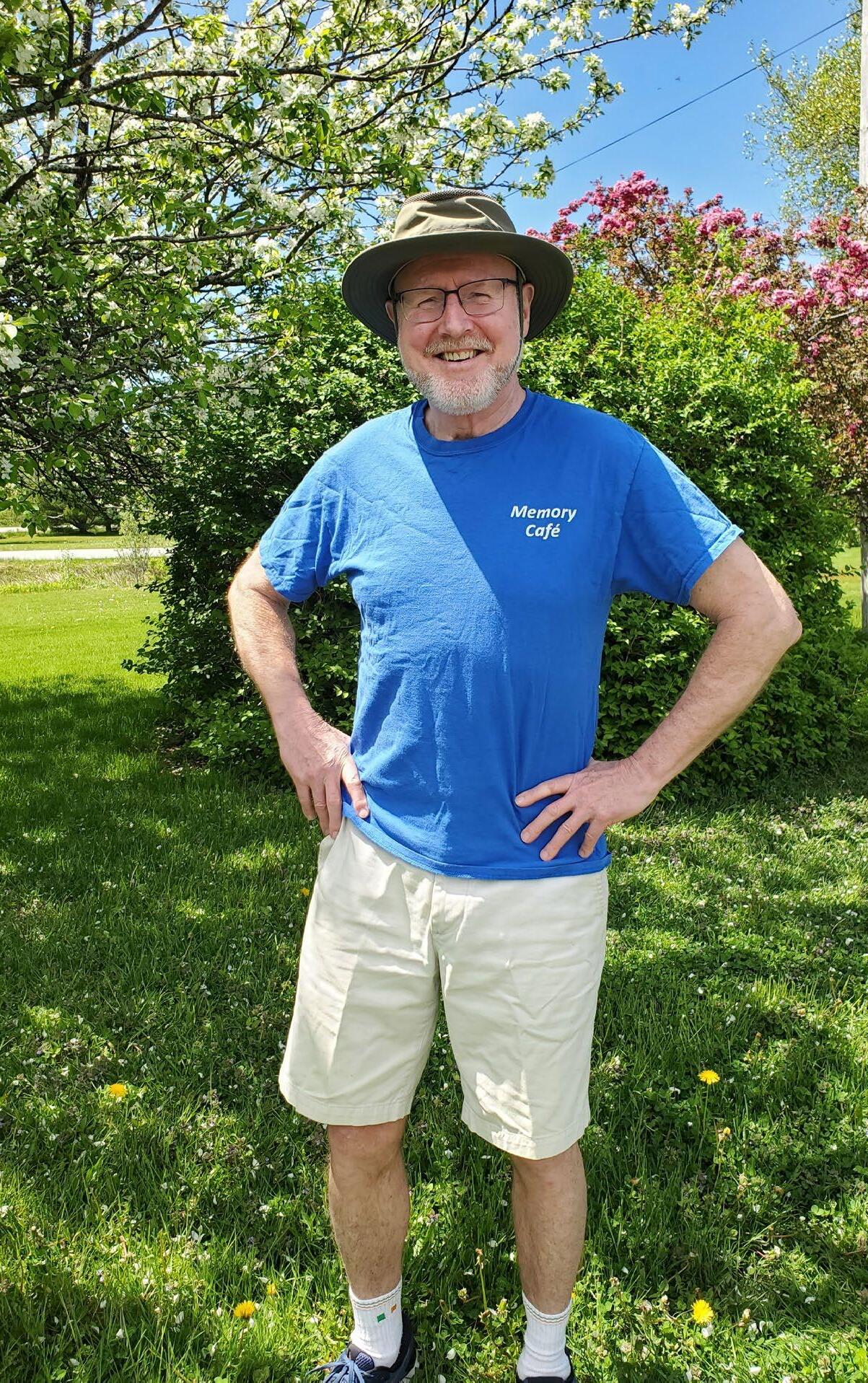
To kick-off Walk Month, we came together with our partners in New Brunswick, Prince Edward Island and Newfoundland & Labrador to put on an Atlantic-wide broadcast. The broadcast was a huge hit and featured stories from our clients, staff, dementia care experts and community members along with performances from the likes of the Ennis Sisters, Lennie Gallant, Old Man Luedecke and more.
Despite challenges of a virtual Walk for the third year in a row, our Walkers showed up for the cause and raised over $130,000 to help support the work that you’re reading about in this report.
Dedicated volunteer, Dominic Boyd, is a longtime supporter of our annual Walk.This year saw the official launch of Dementia Friendly Communities, a commitment to connecting with and educating key groups across Nova Scotia to help make our province more dementia friendly.
Led by staff member Beth House, this initiative aims to create communities that support, respect and include people living with dementia and their partners in care in the places they live, work and play. It’s a community that values contribution, opportunity and choice.
Our first year of Dementia Friendly Communities included contributing to a Canada-wide working group, connecting with other Alzheimer Societies and providing public presentations.
With plans to engage our volunteer base, collaborate with libraries throughout the province and to provide additional training to first responders, we can’t wait to see what next year brings!
Through a guiding principle of “Not About us Without us,” we’ll be creating a steering committee of Nova Scotians with lived experience – both people living with dementia and care partners – to consult regularly on major initiatives and help identify priorities. While people with lived experience are integrated across most of our planning committees, we identified the need for a dedicated group of advisors.
This steering committee will be integrated into our governance model, operating parallel to our Board of Directors on an expanded organizational chart.
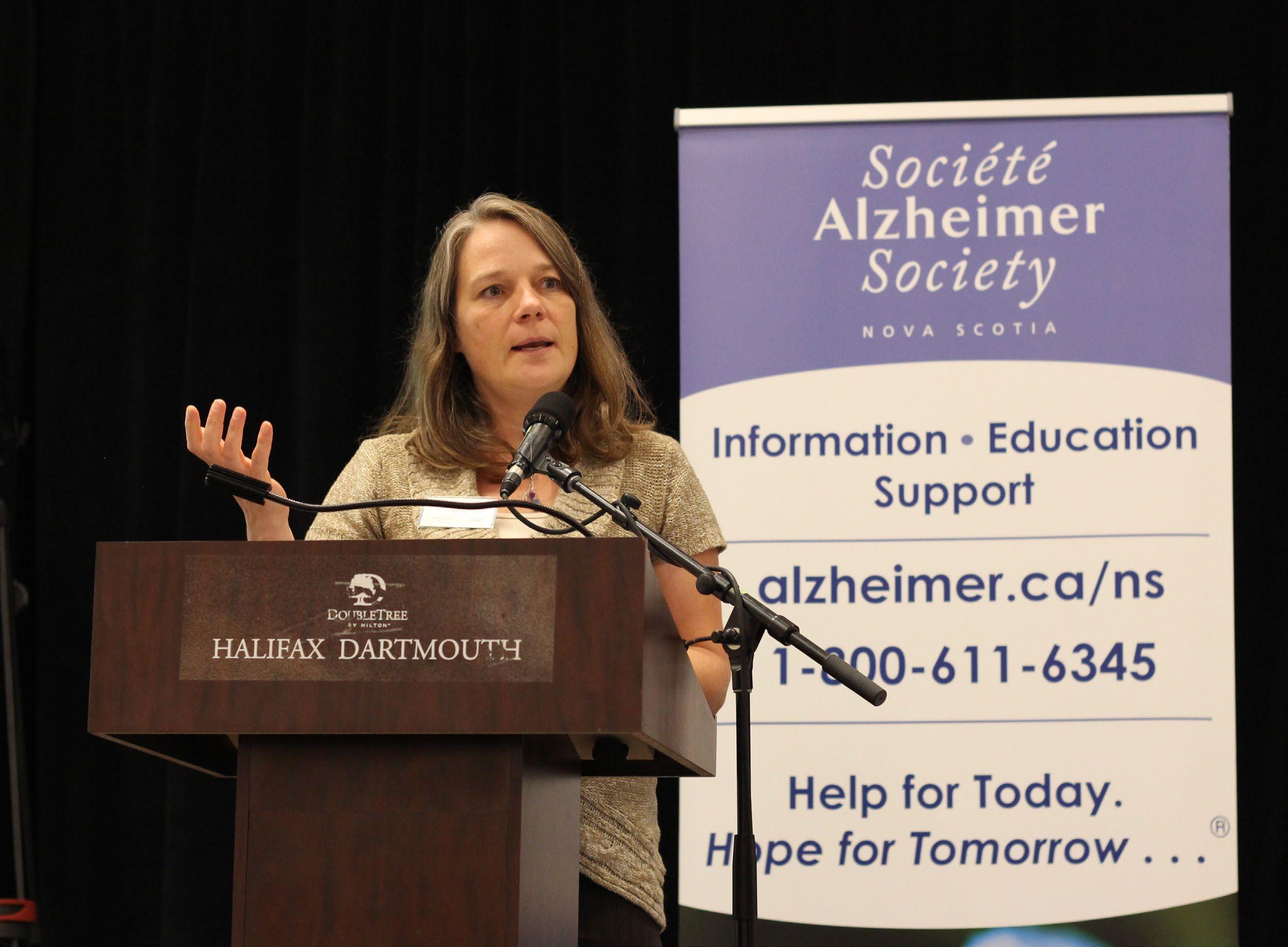
Enhance the Quality of
To be truly committed to I.D.E.A. – Inclusion, Diversity, Equity and Accessibility – we need to better understand who our clients are and the communities they belong to.
Understanding our client as a whole person is essential in being person-centred. By understanding the whole person, we will be able to support our clients’ needs in ways that are affirming and culturally relevant.
This year, our Programs & Services team have started a direct approach to collecting demographic data from our clients. They’ve begun asking questions around race, ethnicity, gender identity, sexual orientation, health, well-being and more.

These questions are being asked to existing clients during regular follow up calls and will be asked to new clients during their intake. We’ve also hired a dedicated Intake Coordinator to streamline this process.
We remain committed to supporting ALL Nova Scotians on the dementia journey, and we will use this and other data to further increase relevance and accessibility to our programs and support services.
We have a wide variety of programs for our clients to access, from education to support. We have programs that are open to the public, and those specific to care partners, people with dementia as well as pair programs – where the person with dementia and their care partner participate together. We strive to provide the right program at the right time to meet our clients’ needs.
Throughout 2022-2023, we provided:
• Nearly 4,000 direct contacts through our confidential InfoLine Service
• 227 hours of support to 354 care partners through our Family Caregiver Education Series and Caregiver Support Groups
• 60 hours of pair programs to 64 clients in Shaping the Journey and Artful Afternoon
• 21 hours of support through our most specialized programming, Connections Hub and Coffee & Conversation
• 20 sessions of U-First!™ for Healthcare to 343 staff in frontline dementia care
Did you know that 45% of our annual budget comes from fundraising?
We have dedicated supporters across the province who volunteer to host their own fundraisers on behalf of the Society. These initiatives raised a total of $33,315 for us this year!
These fundraisers come in a lot of shapes and forms. We see folks bringing the community together, like the Axemen Football Team who raised $7,170 in a door-to-door campaign in February.
Individuals come up with unique ideas, like Kathy Bethune who sells homemade cakes to her friends and coworkers all year long, raising $1,300 this year.

Businesses take part too – East Coast Financing donated $100 for each car sold in the month of January, leading to $6,000 raised for the Society.

YOU can help! Make a donation today, or talk to our team about hosting your own fundraiser!
Visit alzheimer.ca/ns/take-action/ fundraise-participate
The Society is responsive to changing needs, and work is underway to officially launch a mental health counselling pilot project in the 20232024 fiscal year. Our longstanding staff member, Kara GouthroMurgatroyd, recently became a Registered Counselling Therapist and will be offering this expanded scope of service.

This new service will address the present gaps in services found in the Nova Scotia Dementia Care Survey preliminary results. See page 19 for more information.
This pilot project will provide shortterm counselling therapy to people with early-stage dementia and their care partners. The pilot will run for 12 months beginning in June 2023.
By offering free mental health counselling, we will support those affected by dementia to have the skills and resources to live well.
Over 320 healthcare professionals are educated annually via our U-First!™ for Healthcare program. This year, we took a bold step to ensure we can be continually responsive to the changing needs of healthcare in our province.
Our colleagues at the Alzheimer Society of Ontario have historically provided facilitator training, but in November 2022, their team came to Nova Scotia and trained two of our staff members to become U-First!™ trainers.
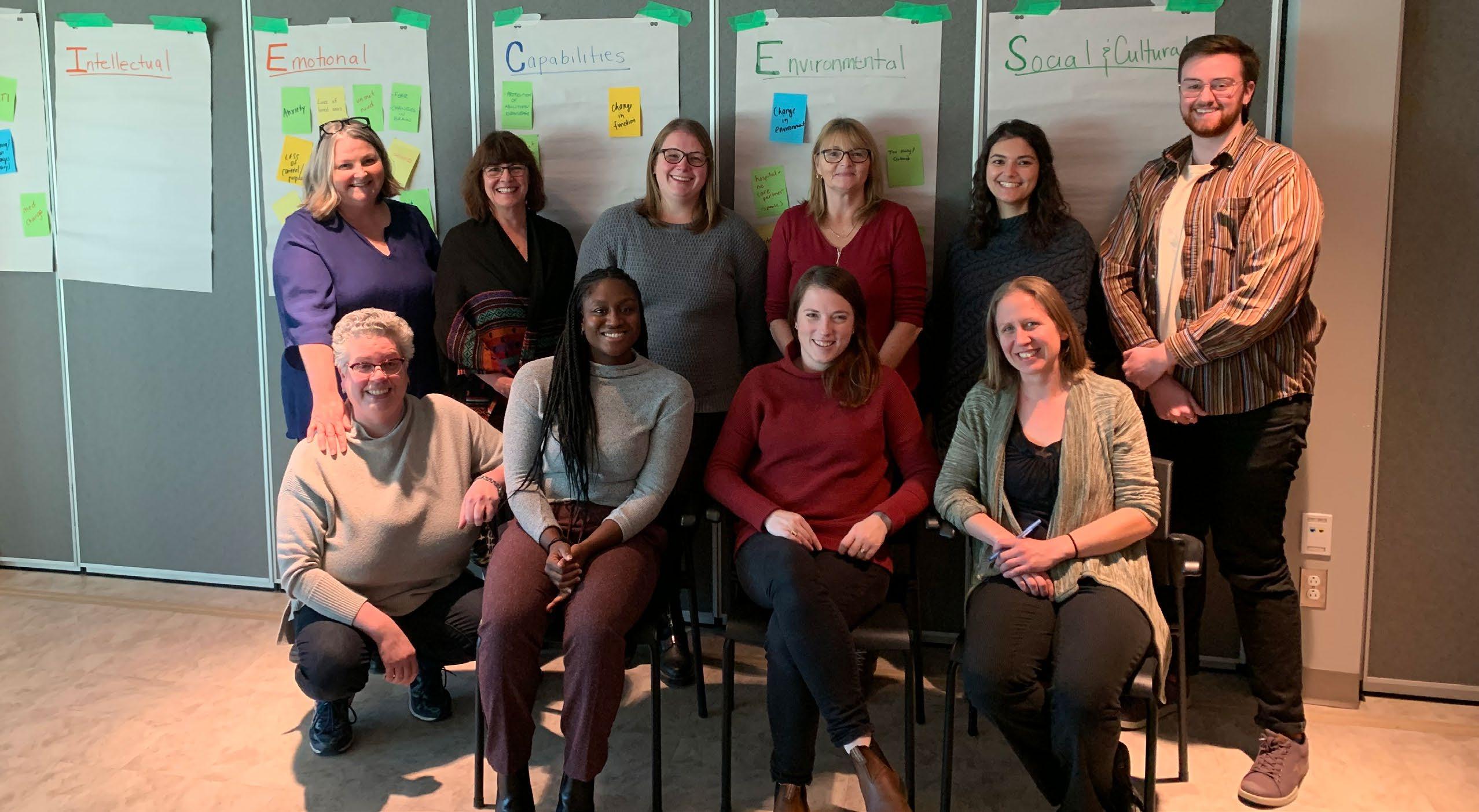
This means that we now have the capacity to train facilitators in-house, and in turn, be of vital support to our healthcare communities across the province.
U-First!™ for Healthcare is a one day training session for government funded long-term care and home support agencies, providing a common language and framework to better support people with behaviour changes related to dementia and helps develop new skills to feel more confident in interactions with people living with dementia.
Our First Link® referral program builds relationships with our healthcare partners as we support their patients and become a trusted source of information. This program connects their patients and care partners with confidential, timely support and education.
Through this program, our healthcare partners directly refer their patients to the Society, and we contact them within three weeks. This year, we had 600 referrals from our health care partners. These direct referrals help to avoid crisis, as it means we connect to families up to 11 months sooner than those who self-refer.*
“I have have made MANY First Link referrals since its inception and find it invaluable for my dementia patients and their families. It is such a needed and useful service. Thank you so much!”
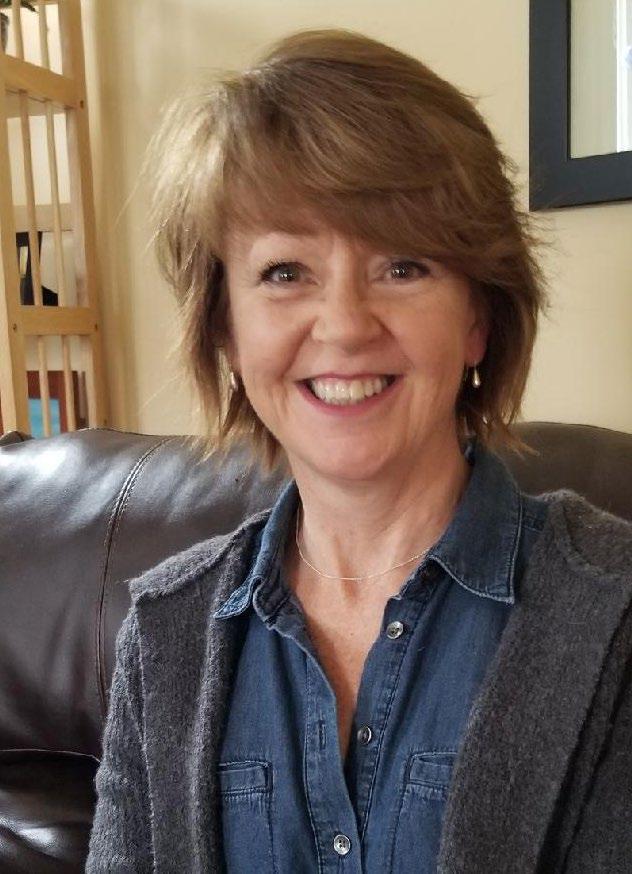
*Throwing a lifeline’: the role of First Link® in enhancing support for individuals with dementia and their caregivers. Carrie A McAiney (2012)
We have a special group of donors at the Society who spread their giving throughout the year by being a monthly recurring donor. In this fiscal year, their monthly gifts totalled $18,668. These donations directly support the programs and services that you’re reading about in this report.
To become a monthly donor, please visit alzheimer.ca/ns/take-action/donate
“I know that my contribution helps the Society provide education opportunities and support for those who have been diagnosed and their care partners.”
- Janet Kokocki, Monthly DonorJanet Kokocki
Welcoming attendees back in-person for the first time since 2019, we held our first ever hybrid Conference on October 25, 2022. The flexibility of both in-person and online options brought together 338 attendees from across Nova Scotia and beyond to learn about navigating dementia care.
We were honored to host Dr. Joshua Armstrong, the author of the Landmark Study, as our keynote speaker. Volume one of this report is the biggest study of its kind in Canada in 12 years.
In order to better respond to the needs of those we support, we will be expanding our sole Community Night event into seven separate in-person events in communities across the entire province. This will help ensure Nova Scotians on the dementia journey get access to community-specific information and resources. This change will help us meet the unique needs of both the dementia care sector, our clients, and the general public in the places they call home.
During the conference, we showcased an exhibit featuring artwork of participants in the Artful Afternoon program. Long time participants Sandra Britton and Paula Snook acted as exhibit coordinators and showcased their work to visitors.
This year, we also showcased some of the great work happening across the dementia care sector in Nova Scotia at our Promising Practices Showcase. We heard from three representatives working in home care, longterm care and hospital alternative level of care settings, each with unique perspectives and ideas they have put in place to better support people living with dementia.
“[The Conference] gave me a lot of insight as to the expected increase in the number of people with dementia, and what can we do to help with this increase. Knowledge of risk factors, healthy living is very helpful –that's what I came for.”
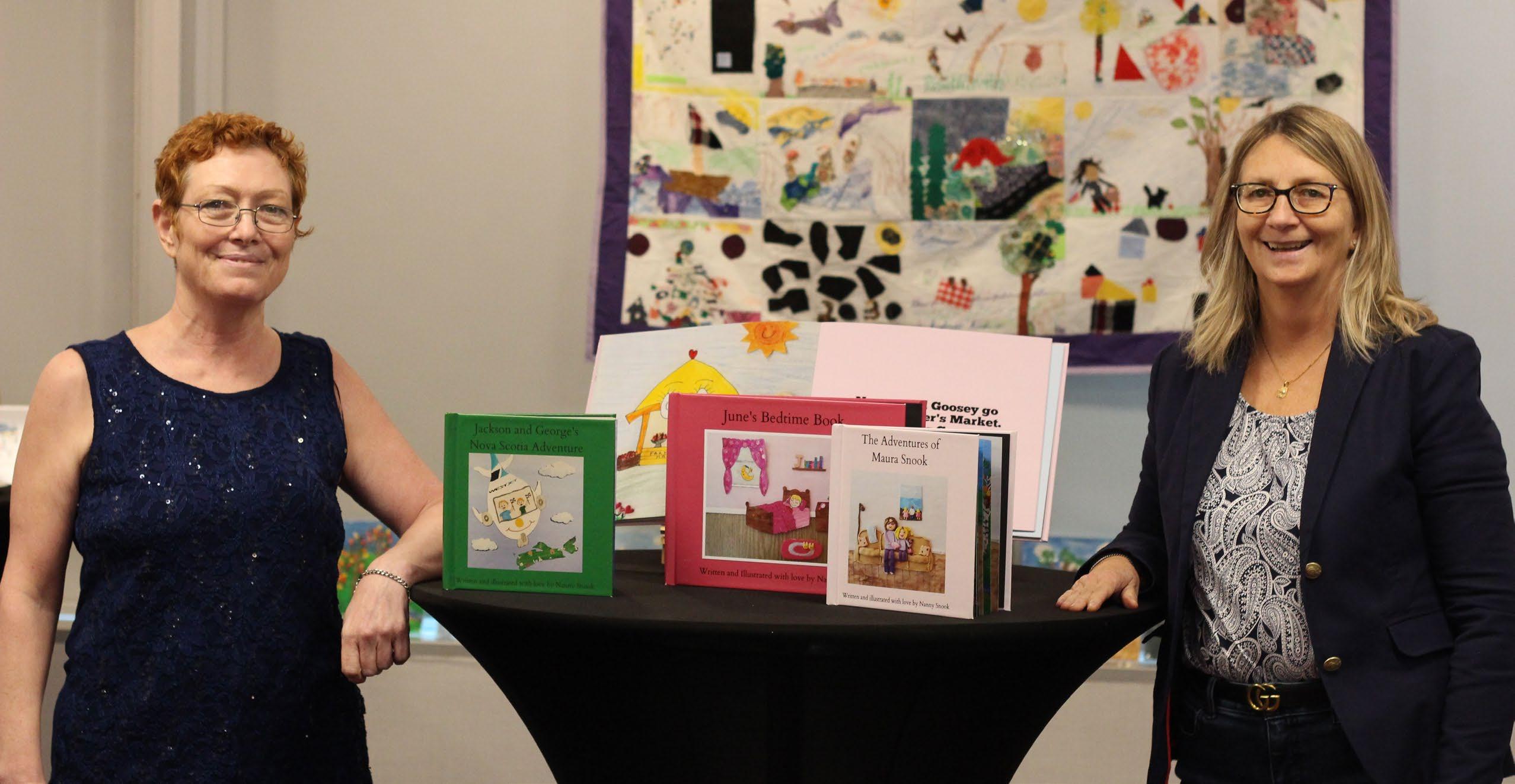
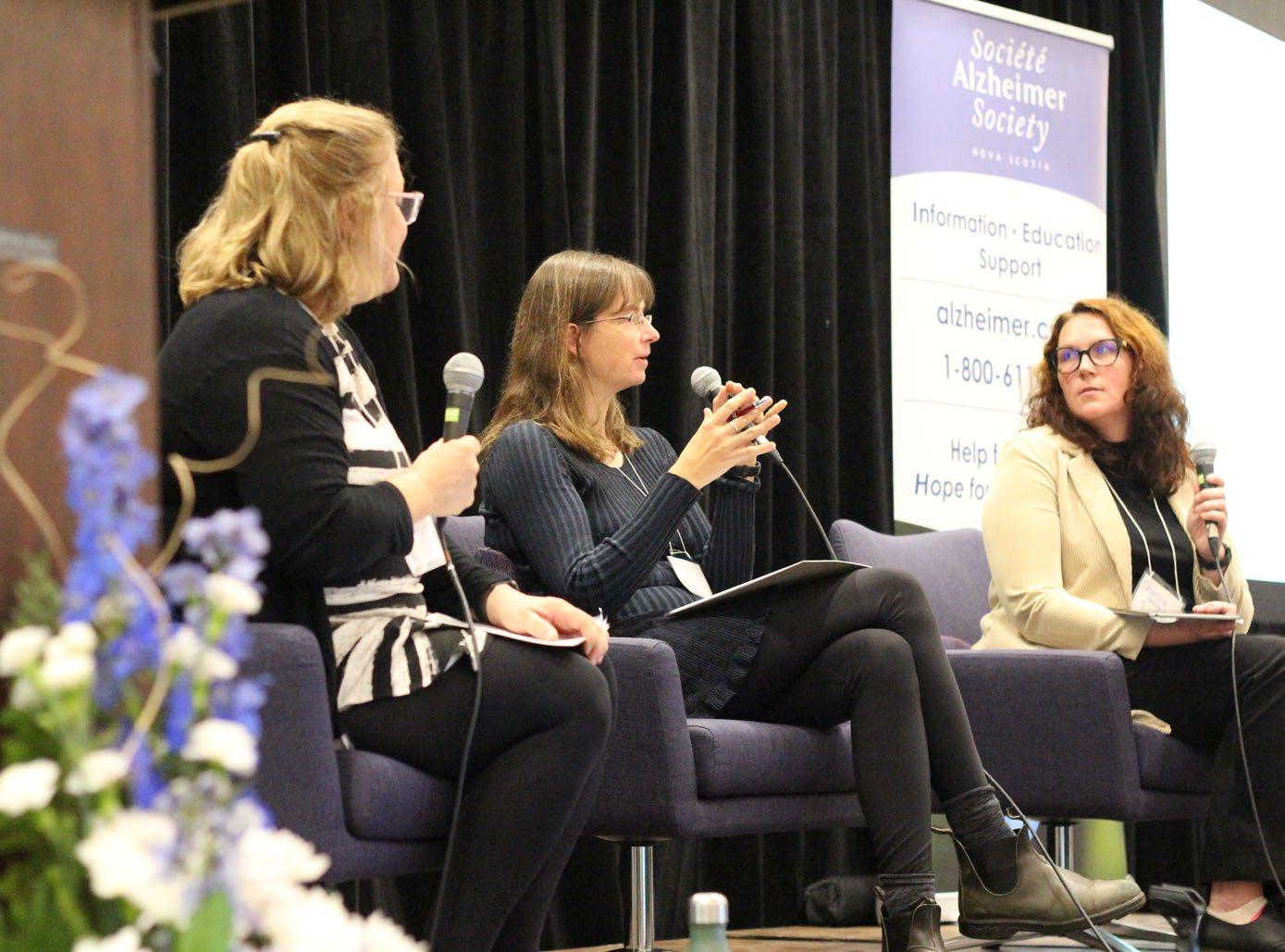

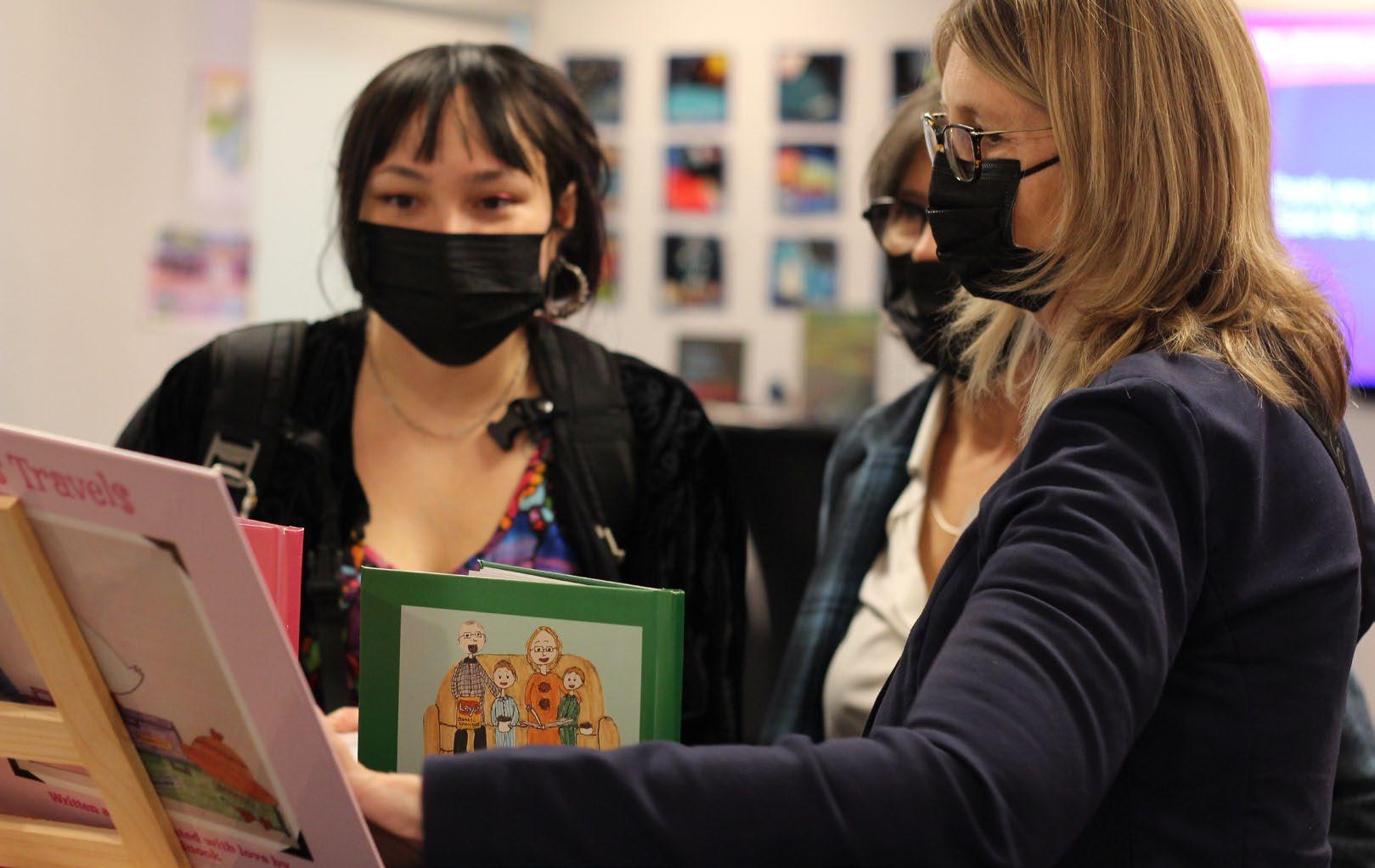

Our role in influencing policy related to dementia often happens behind the scenes. To best serve our stakeholders, it is our duty to listen to a wide range of voices, most importantly our clients, to learn what they need and what is important to them.
We connect with our government partners and peer organizations to share those priorities and explore how we can collectively achieve them. We bring the collective experience of our clients to steering
committees, thinktanks and task forces to ensure they are represented in consultations. We provide countless letters of support endorsing innovative initiatives that could help advance dementia care in our province. We collaborate with our Alzheimer Society Federation partners across the country on key policy issues such as Medical Assistance in Dying (MAiD) and longterm care legislation.
To respond to the projected rates of dementia in Nova Scotia, it’s more important than ever that we positively influence policy.
We’ve heard loud and clear over many years that Nova Scotians are struggling to access a timely dementia diagnosis. It was also a key takeaway from the consultations to develop Nova Scotia’s dementia strategy. We need to make changes in our current system to support future need.
We cannot change it ourselves, but we’re committed to strategizing and providing support to the healthcare system.
Over the past two years, the Gray Initiative on Diagnosis has been a persistent, behind-thescenes effort in honour of one of our founding members, Dr. John Gray.
We have taken the initiative to engage a private donor, and in collaboration with our government and healthcare partners, we are actively evaluating innovative dementia diagnositic models. Our hope is to implement a solution that improves access to diagnosis across Nova Scotia.
Since we opened our doors, advocacy has been a part of our work. We hear continually from clients about issues that are important to them and we aim to be proactive in our response. The Landmark Study has made it clear that we need to increase our efforts in this area as we consider the next phase of our organization.
Many donors choose to include a gift to the Society in their will when they do their estate planning. A gift in a will is a lasting testimony and a way to fulfill a donor’s personal wishes to continue to support those living with dementia in Nova Scotia. Through the generosity of these donors, we received $351,194 in bequests this year.
Alexa McDonough was a standout leader, feminist, philanthropist. She was also a champion of our planned giving program, sharing her story and plans to leave a gift in her will through our Leave a Legacy campaign. When Alexa passed away in January 2022, she left a gift to the Society, continuing her legacy of supporting our programs, services and research.
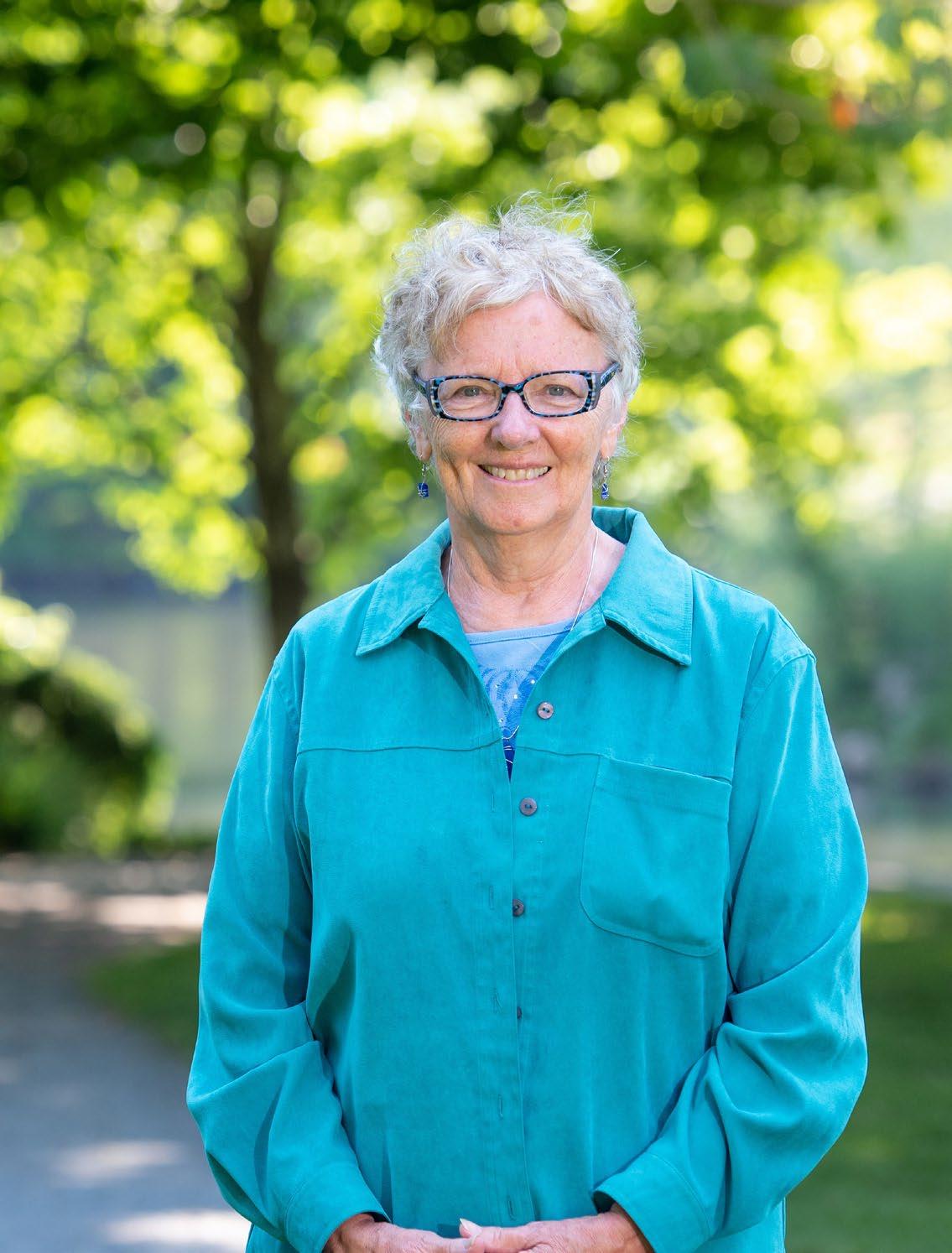
An estate gift is a lasting way to support our work. Visit alzheimer.ca/ns/legacy-giving to find out more.
Advocacy means many things, and can take many forms. The next step will be to hire our first staff member dedicated exclusively to advocacy work. From here, we’ll work with our clients and partners to create a working group of folks with lived experience, and define our advocacy priorities.
We’re committed to supporting dementia research and celebrating students who have chosen this field. Each year, we award bursaries – the Phyllis Horton and Abe Leventhal Student Research Awards – to two outstanding students pursuing dementia research in Nova Scotia. We also support research at the national level through an annual contribution to the Alzheimer Society of Canada’s Research Program.
Niousha Alizadehsaravi, a dietitian candidate completing her Master of Science in Rehabilitation Research at Dalhousie University, received the Phyllis Horton Student Research Award. Under the supervision of Dr. Caitlin McArthur, Niousha is exploring the food and eating experiences of long-term care residents with dementia in hopes of improving the quality of nutritional care for Canadians living with dementia.

Genesis Hebert, a graduate student pursuing a Master of Arts in Family Studies and Gerontology at MSVU, received the Abe Leventhal Student Research Award. She is originally from Edmundston, New Brunswick, and has maternal roots in Acapulco, Mexico. Having worked in long-term care and home care, she is now dedicating her education to gerontology. She will examine the dementia caregiving experiences of those in Hispanic communities, under the supervision of Dr. Janice Keefe.

In collaboration with the Society, Dr. Paula McLaughlin and her research team recently completed a provincewide research survey on dementia care. The survey was used to investigate the current health and social needs of Nova Scotians living with dementia in the community, as well as understand their experience with and attitude towards telehealth. The survey included people living with dementia, as well as their care partners and dementia care professionals.
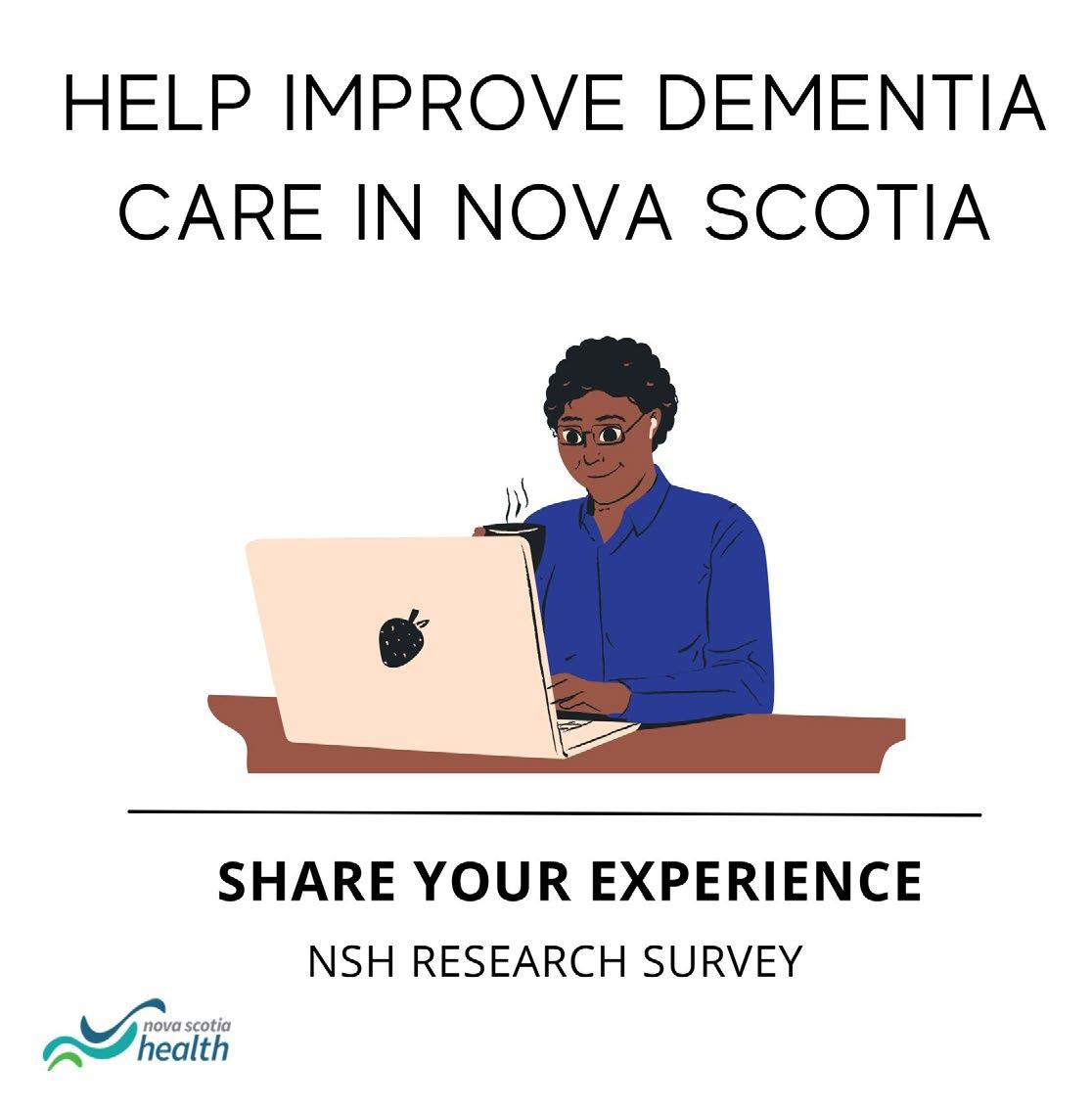
The key findings from this project were that the needs of people living with dementia were not being met with regards to getting a timely diagnosis, accessing treatments, accessing healthcare providers and services, and accessing community supports. The survey also found that telehealth may be suitable for some dementia care services, but not others.
Identifying and understanding the health and social needs of people living with dementia is an important first step in providing quality care and support to these individuals and their
families. The results from this survey will not only help the province adapt their services, but will also help us at the Society better understand the current needs in the community and set our priorities. The results have already provided critical context to support our funding applications, and provided the rationale for our counselling pilot project on page 11 of this report.
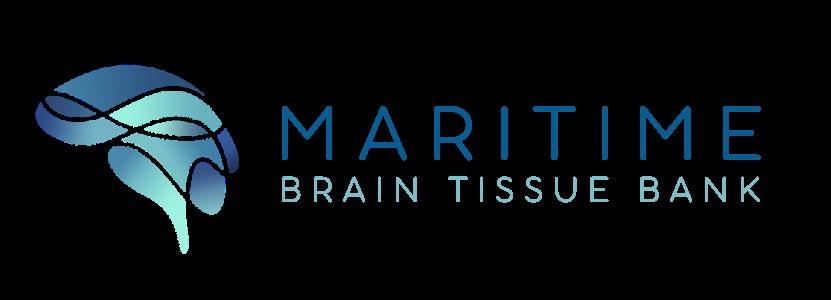
Through a donation from an anonymous foundation, in-kind donation of our staff time, and with the help of the Dalhousie Medical Research Foundation we’re supporting the Maritime Brain Tissue Bank to create a brand identity and a new website.
This new website will fill a gap by creating a public-facing presence for the Maritime Brain Tissue Bank. It will include content for a wide range of audiences, creating a better understanding of what the Maritime Brain Tissue Bank does and why it’s so important.
The Maritime Brain Tissue Bank collects brain tissues to make them available for researchers around the world who are trying to better understand the causes of dementia and other neurological diseases.
The brand identity is complete, including a new logo, tagline, colour palette and font. The new website has been under development through this year and is set to launch in the fall of 2023.
100% of our research initiatives are donor funded!


The brain bank needs tissue donations from people with dementia AND non-diseased brains to conduct their research.

In the next fiscal year, we will be increasing our annual contribution to the brain bank from $10,000 to $15,000.

$65,074


1982
May
The first unofficial meeting over coffee
1983
January
Official start of the Alzheimer Society of Nova Scotia
1993
July
The Maritime Brain Tissue Bank opens
2002
Start of our core Infoline service
2015
Co-authour of the Provincial Dementia Strategy
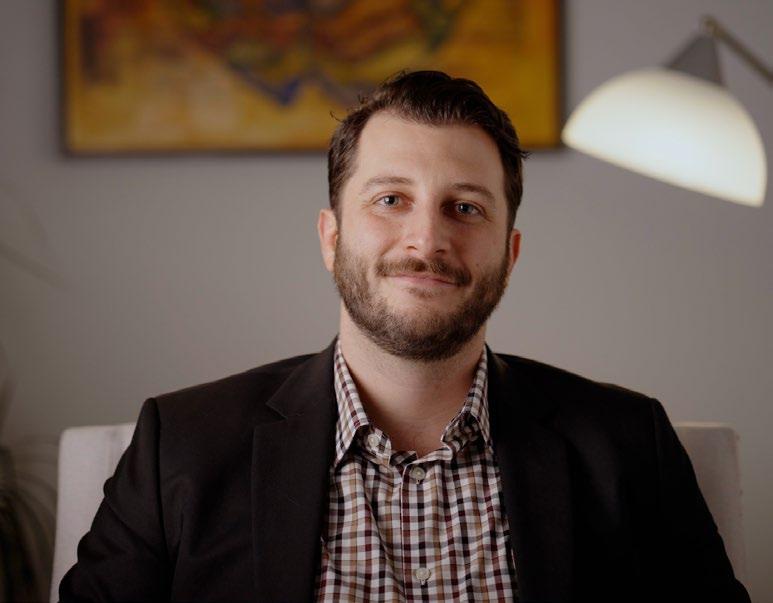
20222027
Launch of new Strategic Plan
As you will have read in these pages, 20222023 was a big year for the Alzheimer Society of Nova Scotia. We launched our new Strategic Intentions that will guide us through the next five years - and we marked the 40th year of the Society!
The Society has come a long way over the past four decades, from convening a group of volunteers in 1983 to supporting thousands of Nova Scotians on the dementia journey today.
I am honoured to have been the board chair for the last three years. In that time, and the 37 years that came before, the Alzheimer Society of Nova Scotia has grown and changed in a lot of ways, thanks to our generous donors and supporters.
Thanks to your help, we support thousands of people each year through our confidential phone service, where Nova Scotians can get timely support from trained professionals. We deliver a wide range of meaningful education and support programs. We provide frontline care staff with a person-centred understanding of dementia.
As we worked through the first year of our new Strategic Intentions and recognized our anniversary, we’ve being doing a lot of reflecting on the success of the past 40 years.
And now, we look to the path forward. The staff team are committed to innovative and responsive solutions, and have been working diligently on strengthening existing services while developing new ways of working to expand accessibility in all areas of the province.
You will have seen a sneak-peak at some of the incredible initiatives that are underway in response to The Landmark Study, and we look forward to continually improving our support of those we exist to serve.
Thank you for 40 years of support!
Mark Gillis Mark GillisWe acknowledge we are in Mi’kma’ki, the ancestral and unceded territory of the Mi’kmaq Nation. We are all treaty people.

The Alzheimer Society is committed to undertaking work to create collaborative and respectful relationships. Together our goal is to identify and develop tools that align with the beliefs and needs of Indigenous, African Nova Scotian, Acadian, and all equity seeking communities across our province.

We are committed to walk as community members and allies in the elimination of racism and discrimination from health care and across society.


To read more about this work, visit alzheimer.ca/ns/idea.
